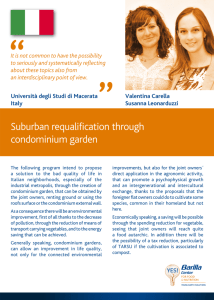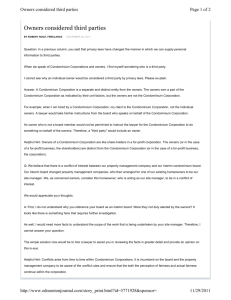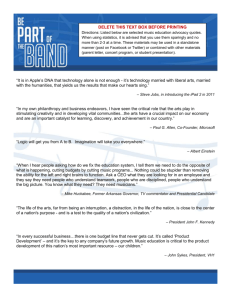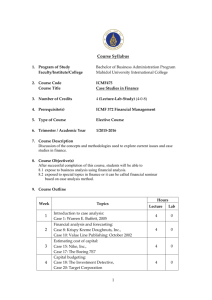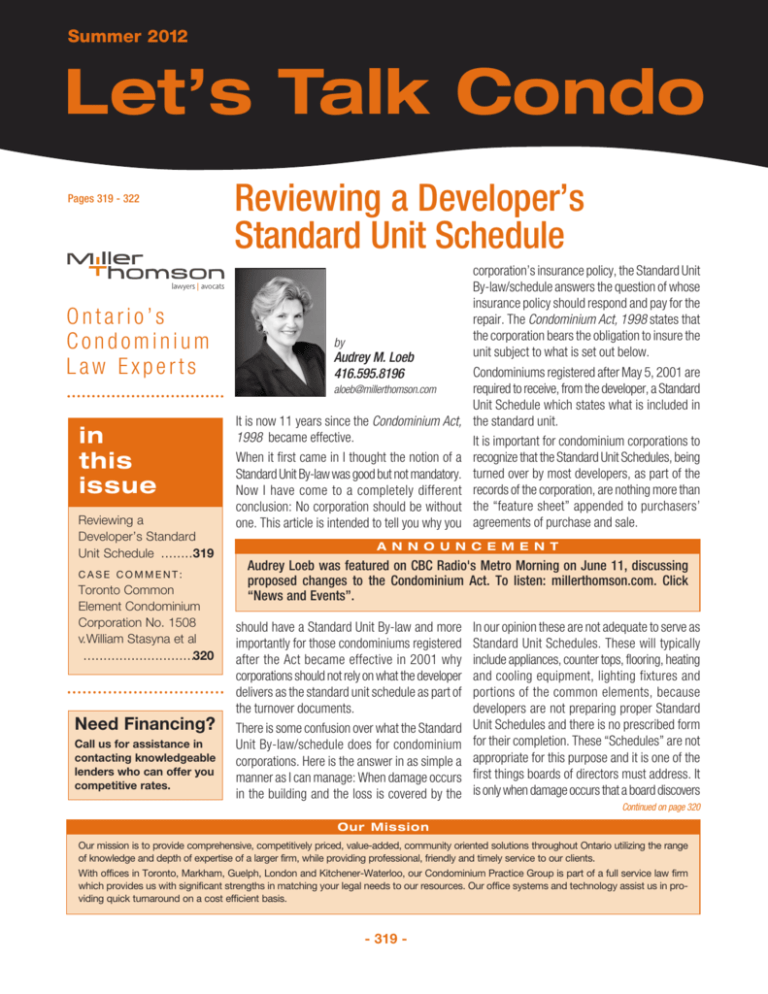
Summer 2012
Let’s Talk Condo
Pages 319 - 322
Ontario’s
Condominium
Law Experts
Reviewing a Developer’s
Standard Unit Schedule
by
Audrey M. Loeb
416.595.8196
aloeb@millerthomson.com
in
this
issue
Reviewing a
Developer’s Standard
Unit Schedule ........319
CASE COMMENT:
Toronto Common
Element Condominium
Corporation No. 1508
v. William Stasyna et al
............................320
Need Financing?
Call us for assistance in
contacting knowledgeable
lenders who can offer you
competitive rates.
It is now 11 years since the Condominium Act,
1998 became effective.
When it first came in I thought the notion of a
Standard Unit By-law was good but not mandatory.
Now I have come to a completely different
conclusion: No corporation should be without
one. This article is intended to tell you why you
corporation’s insurance policy, the Standard Unit
By-law/schedule answers the question of whose
insurance policy should respond and pay for the
repair. The Condominium Act, 1998 states that
the corporation bears the obligation to insure the
unit subject to what is set out below.
Condominiums registered after May 5, 2001 are
required to receive, from the developer, a Standard
Unit Schedule which states what is included in
the standard unit.
It is important for condominium corporations to
recognize that the Standard Unit Schedules, being
turned over by most developers, as part of the
records of the corporation, are nothing more than
the “feature sheet” appended to purchasers’
agreements of purchase and sale.
A N N O U N C E M E N T
Audrey Loeb was featured on CBC Radio's Metro Morning on June 11, discussing
proposed changes to the Condominium Act. To listen: millerthomson.com. Click
“News and Events”.
should have a Standard Unit By-law and more
importantly for those condominiums registered
after the Act became effective in 2001 why
corporations should not rely on what the developer
delivers as the standard unit schedule as part of
the turnover documents.
There is some confusion over what the Standard
Unit By-law/schedule does for condominium
corporations. Here is the answer in as simple a
manner as I can manage: When damage occurs
in the building and the loss is covered by the
In our opinion these are not adequate to serve as
Standard Unit Schedules. These will typically
include appliances, counter tops, flooring, heating
and cooling equipment, lighting fixtures and
portions of the common elements, because
developers are not preparing proper Standard
Unit Schedules and there is no prescribed form
for their completion. These “Schedules” are not
appropriate for this purpose and it is one of the
first things boards of directors must address. It
is only when damage occurs that a board discovers
Continued on page 320
Our Mission
Our mission is to provide comprehensive, competitively priced, value-added, community oriented solutions throughout Ontario utilizing the range
of knowledge and depth of expertise of a larger firm, while providing professional, friendly and timely service to our clients.
With offices in Toronto, Markham, Guelph, London and Kitchener-Waterloo, our Condominium Practice Group is part of a full service law firm
which provides us with significant strengths in matching your legal needs to our resources. Our office systems and technology assist us in providing quick turnaround on a cost efficient basis.
- 319 -
Continued from page 319
that the corporation’s insurance policy has to respond by paying for
flooring and other items enumerated in the Standard Unit Schedule
prepared by the developer and if there is no appropriate deductible
recovery clause the corporations may also be responsible for that as
well.
Since the developers’ Standard Unit Schedule is what governs
corporation’s obligations when there is an insurance loss, corporations
that do not have good deductible provisions contained within their
by-laws and who have the typical developer prepared Standard Unit
Schedule, will find themselves responsible for costs for which they
should not be.
NEWSLETTER
Condominium corporations that have received these schedules from
the developer as part of their turnover documents should review
them immediately and carefully to determine whether what is listed
in the schedule is appropriately part of a Standard Unit Schedule. The
more prudent route would be to send them to the corporation’s legal
counsel for this purpose.
In the meantime we are endeavouring to have developer’s solicitors
encourage their clients to do this properly. We are asking them to
take the time to prepare them properly and enact them as by-laws.
•••
TIP
A condominium corporation must apply the following 3-step analysis when it comes to repair of damage to a unit: (1) Is the
damage covered by the Corporation's insurance policy (which covers "standard" unit components)? If so, then in most
cases the Corporation's insurer or the Corporation itself must cover the repair costs (although the owner may be responsible
for the repair costs under the deductible portion); (2) Did the Corporation neglect to carry out reasonable repair and/or
maintenance of known common element defects which caused the damage to the unit? In these relatively rare and specific
circumstances, the Corporation could be responsible for the unit repair costs; (3) If 1 and 2 (above) do not apply, the unit
owner must repair the damage (as per the Declaration), within a reasonable time, failing which the Corporation must carry
out the repairs, on the owner's behalf, and add the costs to the owner's common expenses.
CASE
COMMENT
Toronto Common Element Condominium
Corporation No.1508 v. William Stasyna et al
Respondents—to remove certain alterations to common elements
at the Respondents' request.
THE FACTS
The Respondents owned three parcels of tied land in the residential
by
housing development comprising TCECC 1508. Between 2004 and
Patrick Greco
2007, the Respondents undertook various landscaping to their
416.595.2982
backyards including trees, shrubs, patios and stones. In each case,
pgreco@millerthomson.com
the landscaping encroached on a common access walkway area
BACKGROUND
that abutted the rear of their parcels and which was part of the
The unit owners of a condominium corporation share a legal interest common elements.
in the corporation's common elements. As such, section 98 of the In each case, shortly after the landscaping was installed, TCECC
Condominium Act, 1998 (the “Act”) provides that an owner may not 1508 sent a demand letter to the respective owners requiring them
make an addition, alteration or improvement to the common elements to remove the landscaping within approximately one month's time.
unless the corporation’s Board of Directors has approved the change The Respondents did not take any steps to comply and did not hear
by resolution and the owner and the corporation have entered into from TCECC 1508 until August 2009. During that time, however, other
an agreement (commonly referred to as a “section 98 agreement”) owners received similar notices and complied with them. At TCECC
allocating the cost, maintenance, repair and insurance obligations 1508's annual general meeting in September 2009, the owners
as between the owner and the corporation.
decided that all common elements had to be returned to their original
In Toronto Common Element Condominium Corporation No. 1508 form by August 2010. The Respondents received written notice from
(“TCECC 1508”) v. William Stasyna et al (the “Respondents”), TCECC the board of TCECC 1508 advising of this one-year grace period.
1508 made an application to the Ontario Superior Court of Justice After the Respondents failed to remove the offending landscaping by
seeking a compliance order requiring certain unit owners—the
Continued on page 321
- 320 40 King Street West Suite 5800, P.O. Box 1011, Toronto, ON, Canada M5H 3S1
Tel. 416.595.8500 • Toll Free 1.888.762.5559 ext.2968 • Fax 416.595.8695 • www.millerthomson.com
NEWSLETTER
TIP
Is your condominium corporation considering investing money from its reserve fund account? We recommend that a letter
be sent to the investment advisor handling the corporation’s investments confirming that the corporation is relying on his
knowledge and compliance with the investment provisions of the Condominium Act, 1998 and the regulations passed
pursuant to the Act.
Continued from page 320
the August 2010 deadline, the parties’ lawyers made modest efforts
to settle the matter. Thereafter, instead of proceeding with mediation,
TCECC 1508's lawyer brought a court application seeking a compliance
order against the Respondents pursuant to section 134 of the Act.
The court examined four specific issues.
ISSUE 1: LIMITATION PERIOD
The Respondents took the position that the application was statuebarred as it was commenced after the two-year limitation period
following discovery of the landscaping by TCECC 1508. The court
rejected this argument for a number of reasons, including: (i) TCECC
1508 sought compliance with the Act not merely with its governing
documents; (ii) TCECC 1508 had never changed its position as to noncompliance but had simply attempted less drastic means of resolution;
and (iii) the Declaration of TCECC 1508 contained an article stating
that any failure to seek enforcement would not constitute a waiver
of TCECC 1508's rights.
Secondly, the Respondents asked the court to apply the doctrine de
minimis non curat lex (“the law does not concern itself with trifles”)
on the basis that the changes to the common access walkway were
insignificant in nature. The court again disagreed, finding that the
changes were not of a minor or merely decorative nature but were
instead incorporated into the land and affected access to the walkway.
Finally, the court noted that equitable remedies are discretionary and
required the Respondents to come to court with clean hands. This
was simply not the case where the Respondents had first chosen to
ignore TCECC 1508's good faith notices demanding compliance.
ISSUE 4: COSTS OF REMEDIATION AND OF THE APPLICATION
On finding that the Respondents would be required to comply with
section 98 and therefore restore the common elements appurtenant
to their units to their original state, the court then turned his mind to
the costs of the remediation and of the application itself.
The Respondents were made to pay for the restoration of the common
elements which they had altered without the consent of TCECC 1508.
ISSUE 2: APPLICABILITY OF MEDIATION/ARBITRATION
The court found that this was only fair given that other unit owners
The Respondents also argued that the court had no jurisdiction to hear who had received notices had done the same at their own expense.
the application because TCECC 1508 failed to first pursue mediation
As the successful party, TCECC 1508 sought its costs on a substantial
and/or arbitration pursuant to sections 132 and 134 of the Act. These
indemnity basis based on the indemnity provision of its Declaration.
sections require that, where there is a disagreement between a
In clearly seeking to craft a less onerous costs award against the
condominium corporation and an owner as to the declaration, by-laws
Respondents, the court found that the “costs” mentioned in the
or rules of the corporation, the parties agree to submit the dispute
Declaration do not specifically discuss legal costs arising out of a
to mediation and arbitration and that doing so is a pre-condition to
proceeding. The court held that even where there is a contractual
bringing an application to the court.
right to recover legal fees, the right is still subject to the court’s
The court held that the mediation/arbitration provisions of the Act do discretion under the Courts of Justice Act. It was the court’s opinion
not apply to an application seeking compliance with the Act itself. More that there was no entitlement to substantial indemnity costs as the
practically, mediation would not remedy the fact that the Respondents Respondents’ conduct was no worse than that of TCECC 1508.
were not in compliance with section 98. TCECC 1508 was found to
Although the court held that TCECC 1508 had a clear legal right to
be entitled to bring its application directly to court.
bring the court application, and regardless of the court’s prior finding
ISSUE 3: EQUITABLE DEFENCES
that mediation prior to the application would have been of little value,
The Respondents asked the court to exercise its equitable jurisdiction when it came to costs the court put a great deal of importance on
to find that TCECC 1508's application was precluded by the doctrine TCECC 1508’s failure to mediate the matter. The court found that
of laches, that is, that TCECC 1508's delay in prosecuting the non- “mediation, though not mandatory, could have resolved this conflict
compliance created an implied acquiescence to the landscaping in a more cost-effective manner” and TCECC 1508 “unnecessarily
such that it was unreasonable to prosecute the application. The court wasted time and expense by insisting on bringing these proceedings”.
found that TCECC 1508 did not “sleep on its rights” and had sought It is difficult to reconcile these comments of the court with the
compliance from the Respondents as early as 2005.
Continued onpage 322
NEWSLETTER
TIP
If your condominium corporation is in the process of passing new by-laws, we recommend that before holding a meeting
to vote on the by-laws, an owners information meeting be held to discuss the purpose and objectives of the new by-laws
and to give owners the opportunity to provide feedback.
- 321 40 King Street West Suite 5800, P.O. Box 1011, Toronto, ON, Canada M5H 3S1
Tel. 416.595.8500 • Toll Free 1.888.762.5559 ext.2968 • Fax 416.595.8695 • www.millerthomson.com
NEWSLETTER
TIP
The Notice of the Annual General Meeting should contain a section setting out the criteria for being able to run for a
position on the board of directors. The eligibility criteria can be found in the condominium corporation’s General Operating
By-law and should be reviewed for compliance with the Condominium Act, 1998.
Continued from page 321
corporation’s absolute right and obligation to enforce the Act vis-àvis unit owners coupled with the Respondents recalcitrance over the
years leading up to the application.
TCECC 1508 was awarded costs on a partial indemnity basis discounted
by 20 percent to take into account the court’s displeasure with TCECC
1508’s failure to attempt to mediate.
LESSONS TO TAKE AWAY FROM THE DECISION
A corporation’s Board of Directors finds itself in a tough spot when
unit owners demand compliance from a non-compliant owner in an
environment where the courts have issued a number of recent
decisions expressing their displeasure at such issues working their
way through to the courts.
The key is to manage these situations with a consistent and reasonably
swift hand. Warning notices and demand letters should go out as
soon as possible after discovery of non-compliance. If the offending
unit owner fails to comply, a reasonable attempt at negotiation or
mediation should be offered, where sensible. A well drafted mediation
and arbitration by-law, with clear and firm deadlines, is essential.
Even if such steps are sure to be a failure, a condominium corporation
must be able to show an application judge that it made good faith
efforts to resolve the issue prior to bringing it to court. Doing so will
assist the corporation in recovering a greater portion of its legal fees
through a costs award.
While timely and thought-out enforcement can be difficult in
condominiums – where the Board of Directors can always change
– it is crucial in ensuring a fast and satisfactory resolution to compliance
issues while at the same time keeping costs down.
•••
A N N O U N C E M E N T
We are proud to announce that Audrey Loeb recently received the Alumni Gold Key Award from Osgoode Hall Law
School. This award recognizes exceptional professional achievement, leadership in legal practice, and contribution to
the community. Another remarkable achievement for Audrey’s mantle. Congratulations, Audrey!
OUR CONDOMINIUM PRACTICE GROUP
Audrey M. Loeb
General
aloeb@millerthomson.com
416.595.8196
Marko Djurdjevac
General
mdjurdjevac@millerthomson.com
416.595.8517
Jeffrey Lem
General
jlem@millerthomson.com
905.415.6715
Patricia M. Conway
Litigation
pconway@millerthomson.com
416.595.8507
Luxmen Aloysius
General
laloysius@millerthomson.com
416.595.8181
Odysseas Papadimitriou
General
opapadimitriou@millerthomson.com
416.595.8559
Dražen Bulat
Construction
dbulat@millerthomson.com
416.595.8613
Patrick Greco
Litigation
pgreco@millerthomson.com
416.595.2982
André Nowakowski
Employment
anowakowski@millerthomson.com
416.595.2986
Tamara Farber
Environmental
tfarber@millerthomson.com
416.595.8520
Megan Mackey
Litigation
mmackey@millerthomson.com
416.595.8623
Lizann McInnes
Liens
condoliens@millerthomson.com
416.597.4370
Ontario’s
Condominium
Law Experts
This newsletter is provided as an information service to our clients and is a summary of current legal issues. These articles are not meant as legal opinions and readers are
cautioned not to act on information provided in this newsletter without seeking specific legal advice with respect to their unique circumstances. Miller Thomson LLP uses
your contact information to send you information on legal topics that may be of interest to you. It does not share your personal information outside the firm, except with
sub-contractors who have agreed to abide by its privacy policy and other rules. If you would like to receive our newsletter, please email bdworatschek@millerthomson.com
Miller Thomson LLP, 2011 All Rights Reserved. All Intellectual Property Rights including copyright in this publication are owned by Miller Thomson LLP. This publication may
be reproduced and distributed in its entirety provided no alterations are made to the form or content. Any other form of reproduction or distribution requires the prior written consent of Miller Thomson LLP which may be requested from Betty Dworatschek Tel: 416.595.2968 Email: bdworatschek@millerthomson.com
- 322 40 King Street West Suite 5800, P.O. Box 1011, Toronto, ON, Canada M5H 3S1
Tel. 416.595.8500 • Toll Free 1.888.762.5559 ext.2968 • Fax 416.595.8695 • www.millerthomson.com

